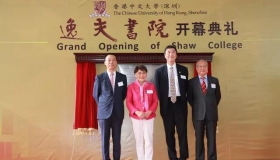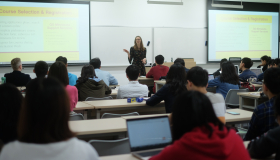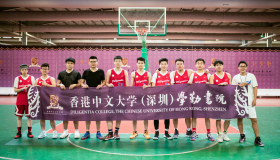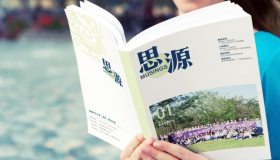CUHK-Shenzhen and TBSI Holds International Forum
From July 30th to 31st, 2018, The Chinese University of Hong Kong, Shenzhen and the Tsinghua-Berkeley Shenzhen Institute (TBSI) jointly held the "2018 CUHK Shenzhen-TBSI Workshop on Machine Learning for Industrial Intelligence", inviting top scholars from all over the world to gather in Nanshan Smart Park to have in-depth discussion on industrial intelligence, intelligent manufacturing, intelligent operation and control, industrial Internet of Things, uncertainty processing, and knowledge integration in the field of machine learning.
The forum attracted well-known business people from Huawei, Dajiang, Tencent, Shanghai Securities, as well as the enthusiastic participation of teachers and students from world-renowned universities such as Tsinghua University, CUHK, Stanford University, Zhejiang University and Xiamen University. Qin Sizhao, Professor at The Chinese University of Hong Kong, Shenzhen, Fellow of IEEE and IFAC, and Zhang Lin, Dean of Tsinghua-Berkeley Shenzhen Institute, attended the opening ceremony.

Opening Remark by Qin Sizhao, CUHK-Shenzhen Professor, and Fellow of IEEE and IFAC

Speech by Zhang Lin, Dean of Tsinghua-Berkeley Shenzhen Institute
In 2017, AlphaGo, a deep learning program developed by Google's DeepMind team, won human beings in Go games and triggered a new round of enthusiasm for AI. In recent years, artificial intelligence seems to penetrate into people's daily lives overnight.
But what is artificial intelligence? What is the current state of research on artificial intelligence? What will happen to the future development trend?
Artificial Intelligence: A Highly Complex Interdisciplinary
As early as 1950, Alan Turing, a pioneer in computer science, proposed that "if a machine can talk to humans and cannot be identified as a machine, then this machine is called intelligent." This is the famous "Turing Test." Later, in the summer of 1956, at the Dartmouth Conference in the United States, the concept of artificial intelligence was formally proposed and established. In more than half a century of research, the cross-integration of cybernetics, information theory, linguistics, psychology, neurophysiology, mathematics and other multidisciplinary fields has greatly enriched the connotation of artificial intelligence and made it suitable for interdisciplinary research and application.
Professor Qin believes that artificial intelligence is an all-encompassing term that has penetrated and driven the traditional subject areas with different driving forces. Previously it was driven by rules and knowledge, and now it is data-driven. From a disciplinary point of view, artificial intelligence is not just a branch of a computer. From the impact on society and industry, artificial intelligence must be interdisciplinary, like an umbrella, covering a lot of disciplines, and eventually forming a kind of disciplinary integration.
Professor Zheng Lizhong from the Massachusetts Institute of Technology believes that artificial intelligence is an extremely complex interdisciplinary subject that requires interaction with many parties. “This forum is very interesting and suitable for TBSI. There are almost no scientists in the computer science field participating in the forum. More experts are from industrial automation areas. I feel that people who are doing market and computer science should be invited to listen to our methods. In debates and conflicts, we can achieve cooperation and achieve an integration.”

图为郑立中教授做主题演讲
Age of Industry 4.0: The Realistic Challenges Faced by Artificial Intelligence
The application of artificial intelligence in the industrial field provides an opportunity for industrial structure upgrading and technological innovation in the new era.
When talking about the original intention of this forum, Professor Qin mentioned the application of artificial intelligence in the field of industrial manufacturing. "Now this batch of artificial intelligence, including big data, is very effective for the following aspects. First, for activities that people are engaged in, such as voice, translation, images, cognition, etc., AI technologies are doing very well; another area is 'Business Intelligence', such as advertising and targeted advertising. The effect of AI is much better than just advertising. Now, the problem we care more about is actually 'Industrial Intelligence', which involves a new generation of the industrial revolution (Industry 4.0). How the results of artificial intelligence in machine learning and other fields are transformed for the field of industrial manufacturing with greater effect is the main purpose of this forum."
"I think that in the past ten or even thirty years, machine learning is breaking through the traditional framework. People who are engaged in machine learning will gradually do things that the traditional field thinks can't do, and there will be breakthroughs in some places. This is an interactive process." Professor Qin said.

Speech by Prof. Qin
Road to the Future: More Standardized and More Diversified
When Microsoft CEO Nadella talked about the development prospects of artificial intelligence, he mentioned that if the total development distance of artificial intelligence is 1 million kilometers, we have just walked a few kilometers. Behind the enthusiasm of various exhibitions and new product launches, how researchers conduct rational analysis and prudent judgment on their current status, and return to basic research and development to drive the industry to develop in a healthy way is a proposition worth pondering.
Regarding the problems existing in the current market application of artificial intelligence, Professor Zheng Lizhong said that in any field, there will be different degrees of chaos in the early stage of development. Researchers should use theory to organize them after the end of the chaos, form a mature methodology, and then choose the right direction of development to support a sustainable development.
"The theory of deep learning is unlikely to bring something like AlphaGo that everyone loves. We have to anticipate this. We should encourage and pool all kinds of forces to drive the whole field to a more standardized direction." Professor Zheng Lizhong said.
“In the specific issues of products and research, we are very limited from theory to implementation. I now intend to use deep learning in the fields of biology, machinery, industrial automation, etc., but there are many restrictions. As we expand deep learning, we face many new challenges, and we need to further expand the application field, making it a non-computer science field for great progress in other research directions."

In the two-day forum, scholars, including academicians of the Norwegian Academy of Sciences, academicians of the Korean Academy of Sciences, academicians of the Canadian Academy of Engineering, professors of the Massachusetts Institute of Technology, brought wonderful speeches to the forum with confrontation of ideas to. It is believed that artificial intelligence, big data and deep learning in the field of industrial manufacturing, both the theoretical research and application, will indicate the direction of its development.
Regarding machine learning and industrial intelligence, these points are not to be missed!
Click on the link to learn about the latest views in Machine Learning.
http://www.cuhk.edu.cn/zh-hans/news/7317
Source: Tsinghua-Berkeley Shenzhen Institute
Wang Zheng, Ma Xiaoshuai




